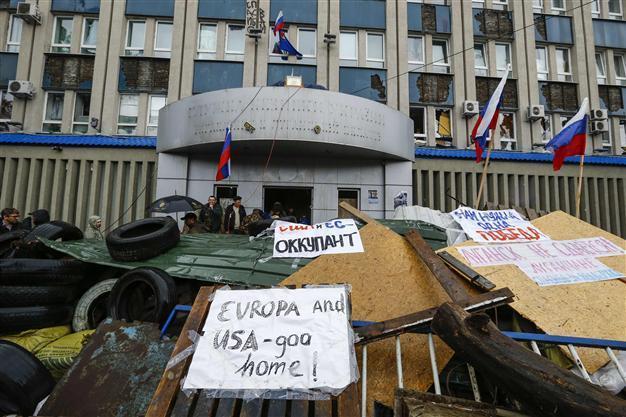Ukraine crisis may trigger ‘domino effect’: FM Davutoğlu
ANKARA

A barricade is set up in front of the seized office of the SBU state security service in Luhansk, April 10. REUTERS Photo
Foreign Minister Ahmet Davutoğlu has warned of a domino effect after Crimea split from Ukraine and joined Russia, saying it could set an example for other frozen conflicts.“Our concern is not only Ukraine. If this trend starts, which is an act against territorial integrity, there are many other frozen conflicts like Trans-Dniester, Abkhazia and Nagorno-Karabakh. We do not want the Ukraine crisis to start a domino effect in and around the Black Sea and the neighboring regions of Turkey,” Davutoğlu told the Japanese Nikkei Asian Review magazine.
Davutoğlu yesterday departed for Japan to attend a meeting of the Non-Proliferation and Disarmament Initiative (NPDI) in Hiroshima. He will also hold talks with his Japanese counterpart, Fumio Kishida.
The foreign minister said Turkey has a unique position over the Ukraine crisis. “Turkey is in a unique position in these developments. We are the only neighbor to both Ukraine and Russia that also has direct access to Crimea; therefore, we are following developments very closely. Poland is also a neighbor to both Russia and Ukraine but with no direct access to Crimea,” Davutoğlu told the magazine, while underlining the importance of international law. “It is very important for us that all these issues will be resolved within the framework of international law, diplomacy and through negotiations with respect to good, neighborly relations.”
The top diplomat also elaborated on the occupation of government buildings and the declaration of people’s republics in the eastern cities of Kharkiv and Donetsk. “These are not positive signals. What I said is important. Kharkiv, Donetsk and other regions should be included actively in the Kyiv government, and everybody must respect the territorial integrity of Ukraine and have a proportional role in the future of the nation,” he said.
Ukrainian President Oleksandr Turchynov promised yesterday not to prosecute pro-Russian activists occupying government buildings if they laid down their arms and halted a four-day standoff.
Davutoğlu, meanwhile, said Turkey did not expect a crisis with Russia over energy. “Turkey’s energy agreements with Russia are clear and have been continuing for many years without any problems.
Turkey of course respects agreements, and we don’t expect any crisis in that sense. But the energy issue is important for all countries, and it should be seen as a tool or instrument of cooperation rather than conflict or confrontation.”
Asked about the 2009 Ukrainian gas crisis in which the flow of Russian gas via Ukraine to Turkey also stopped and about Turkey’s energy options, Davutoğlu said the country was diversifying both its energy resources and routes.
“It’s not just because of the Ukraine crisis, we had already decided to diversify both energy resources and different routes, and the nuclear plants we are building with Japan and Russia are an alternative source of energy. As for natural gas, we are buying from Azerbaijan via the Tanap project. We are diversifying our energy using all these. That is not in regard to the Ukrainian issue; we started this process long before. Concerning this particular issue, we do not expect a crisis, as there are clear agreements between Turkey and Russia. We have not faced big problems until now, and in that sense, we do not expect a crisis,” Davutoğlu said.
















